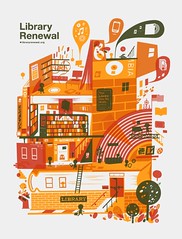This coming Monday, June 6th, Apple will give their annual keynote at the World Wide Developer’s Conference (WWDC) 2011. This is traditionally the stage for announcements about software and operating systems…things that developers for the Apple platforms (iOS and OSX) are centrally concerned with.
This year, in an unprecedented move, Apple’s press release for the WWDC keynote includes details about what they will present, and it centers around three things: the next version of OSX (code-named Lion), iOS 5, and a brand new offering called iCloud. From the press release:
At the keynote, Apple will unveil its next generation software – Lion, the eighth major release of Mac OS® X; iOS 5, the next version of Apple’s advanced mobile operating system which powers the iPad®, iPhone® and iPod touch®; and iCloud®, Apple’s upcoming cloud services offering.
Practically nothing is known at this point about iCloud. There has been speculation that it could be everything from an enhanced media locker in the vein of Amazon Cloudplayer or Google Music Beta to something like enhanced syncing API’s for developers. Apple has been making deals of some type with the major record labels, which means that some form of music sync/streaming is likely, but details will make all the difference about whether it’s more compelling than the above services.
It’s no secret that Apple’s success with web-based services is almost the exact inverse of its success with hardware…nearly every web-based service that Apple has launched has sucked. From iTools, to .mac, to MobileMe, in every case the promise has been much more impressive than the delivery. For each of the pieces that make up MobileMe, other online services provide the service better. Calendar syncing and eMail are both done better by Google, online storage and public web access is done better by Dropbox, and MobileMe gallery is outdone by YouTube and Flickr. Services that are uniquely Apple’s, like Find my iPhone, are well done, but even in this case it’s not universally good…for instance, Back to My Mac is only great when it works. Which is almost never.
I love nothing more than putting on my “make shit up” hat, so I thought I’d give prognostication a shot for what Apple is doing with iCloud. How can Apple move in the right direction with its online services? Here’s what I hope to see from iCloud:
First off, I expect that iCloud will be a suite of services in the same way that they have chosen to brand their iWork and iLife suites. iCloud will be analogous to these local services…the branding for all of Apple’s online offerings. I’m hoping that the reason that Apple is choosing to announce iCloud at the same time as Lion and iOS 5 is that they are all tied together. Or, rather, that iCloud becomes the glue that ties iOS and Lion together, merging a number of local services from iOS and OSX and allowing for seamless data transmission and interaction. Think Dropbox, but deeply integrated into the filesystem, allowing for documents to be edited on any platform, music to be played anywhere, whether mobile or desktop.
If they do this, and then further allow access to the service via API so that app developers can tap directly into your iCloud for file storage, Apple will seriously have changed the game. Not only would it solve syncing issues, but it could also theoretically be a solution for backup…all of your documents and settings for your desktop and mobile devices could be backed up as they are synced. Even better for things like games, iCloud could enable syncing of game states, so that you could play Angry Birds on your iPod Touch, then pick it up on an iPad and have the game pick up just where you left off.
One last prediction…if this is the route that Apple goes (and I hope that it is), one thing that I would love to see in iOS 5 is the addition of account management/multiple accounts on iOS devices. Syncing only works if it’s tied to an identity, and it’s very hard to manage identities on shared mobile devices without some form of account management. There’s no technical reason that iOS can’t support multiple accounts on a single device, and it would actually simplify some parts of the syncing issues for Apple.
We’ll find out everything on Monday…I’m looking forward to seeing if I’m right about any of it.
 I haven’t blogged much about Library Renewal, a new library non-profit that I am involved with…but we’re about to hit ALA Annual, and a bunch of things are coming together online. It seemed like a good time to remind people where they can find us. Here’s a quick list, including the new Youtube channel:
I haven’t blogged much about Library Renewal, a new library non-profit that I am involved with…but we’re about to hit ALA Annual, and a bunch of things are coming together online. It seemed like a good time to remind people where they can find us. Here’s a quick list, including the new Youtube channel: